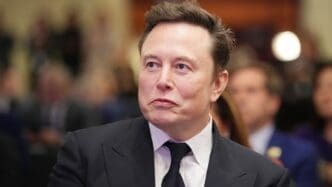Elon Musk, the prominent CEO of Tesla and SpaceX, has recently turned his focus towards European politics, igniting significant concern among political leaders across the continent. This shift follows Musk’s endorsement of former U.S. President Donald Trump’s re-election campaign, signaling a potential alignment with far-right ideologies that have gained traction in various European nations.
Musk’s social media presence on his platform, X (formerly Twitter), has come under intense scrutiny for its provocative content. His tweets often feature inflammatory language and include retweets from far-right and anti-immigrant sources, raising alarms about the impact of his rhetoric. Notably, Musk has publicly expressed support for the far-right Alternative for Germany (AfD) party, which is currently under surveillance for its extremist tendencies. He has also labeled British Prime Minister Keir Starmer an ‘evil tyrant,’ drawing sharp criticism from political circles.
Andrew Chadwick, a professor of political communication, observes that Musk is leveraging X in a manner reminiscent of traditional media moguls who wield significant influence over public discourse to promote their political views. By aligning himself with international far-right movements and amplifying the voices of notable right-wing influencers, Musk is contributing to a growing narrative that challenges mainstream political paradigms.
German Chancellor Olaf Scholz has responded to Musk’s controversial statements by confronting the dilemma of whether to ignore or engage with such potentially damaging rhetoric. Scholz insists that Germany’s future will ultimately be shaped by its citizens, not by the pronouncements of tech moguls. Similarly, French President Emmanuel Macron and Greek Health Minister Adonis Georgiadis have raised alarms about the unchecked power that billionaires like Musk wield over democratic institutions, emphasizing the risks associated with their influence on policy and public opinion.
Musk has also made headlines in British politics, particularly regarding child sexual abuse cases in northern England, which he has controversially linked to immigration and Islam. His accusations against Starmer for allegedly failing to prosecute offenders have been vehemently denied by the Prime Minister, who has condemned Musk’s claims as lies and misinformation, suggesting that they contribute to the amplification of far-right narratives within the UK.
In response to these escalating concerns, the European Union has initiated proceedings against X under the Digital Services Act, aiming to mitigate the spread of harmful content on social media platforms. Despite the backlash, Musk remains an ardent proponent of free speech, often criticizing regulatory measures and drawing parallels between contemporary policies and historic censorship practices in the Soviet Union. This defiance raises questions about the balance between freedom of expression and the responsibility of influential figures in shaping political discourse.
As Musk intensifies his engagement in European politics, the ramifications of his actions continue to unfold. While his approach appears to resonate with certain right-wing factions, it poses considerable risks to democratic institutions and may jeopardize his business interests in Europe, particularly in light of declining vehicle registrations for Tesla in the region. The intersection of Musk’s political involvement and corporate strategy is a critical area of observation for stakeholders in both the political arena and the business landscape as they navigate these complex dynamics.








